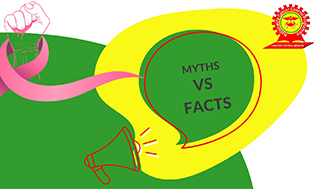Unveiling Myths and Facts About Cancer

Hello and welcome to the Cancer Control Mission blog! We’re excited to have you join us on this journey to demystify cancer. With so much information out there, it's easy to get lost in a sea of myths and misconceptions. Our mission today is to shine a light on the truth and provide you with clear, straightforward facts about cancer. So, grab a cup of tea, get comfortable, and let’s dive into some of the most common myths and the facts that debunk them.
Myth 1: Cancer Is Always a Death Sentence
Fact: Not True! Many types of cancer are treatable and even curable, especially when detected early. Thanks to advances in medical research, treatments like chemotherapy, radiation therapy, and immunotherapy are more effective than ever. For instance, the survival rates for breast and prostate cancer have significantly improved over the past few decades. Regular screenings and early detection play a crucial role in increasing the chances of successful treatment.
Myth 2: Cancer Only Affects Older Adults
Fact: Cancer Does Not Discriminate by Age. While it’s true that the risk of cancer increases with age, people of all ages, including children and young adults, can develop cancer. Certain types of cancer, such as testicular cancer and leukemia, are more common in younger individuals. This is why it’s important for everyone to be aware of their bodies and seek medical advice if something feels off, regardless of age.
Myth 3: Sugar Makes Cancer Grow Faster
Fact: A Sweet Misconception. This is a common myth that has caused unnecessary worry. While cancer cells do consume more glucose (a type of sugar) than normal cells, there is no direct evidence that eating sugar will make cancer worse or that eliminating sugar will prevent cancer. However, a balanced diet is essential for overall health and well-being, especially when undergoing cancer treatment.
Myth 4: Cancer Is Contagious
Fact: You Can’t Catch Cancer. Cancer is not a communicable disease like the flu or a cold. You cannot "catch" cancer from someone else. However, some cancers are linked to viral infections, such as human papillomavirus (HPV) causing cervical cancer and hepatitis B or C leading to liver cancer. Vaccinations and safe practices can help prevent these virus-related cancers.
Myth 5: Herbal Remedies Can Cure Cancer
Fact: Be Cautious with Alternative Treatments. While some herbal remedies might help alleviate symptoms or improve quality of life, there is no scientific evidence that they can cure cancer. It's crucial to discuss any alternative treatments with your healthcare provider to ensure they don't interfere with conventional treatments. Relying solely on unproven remedies can delay effective treatment and reduce the chances of recovery.
Myth 6: All Tumors Are Cancerous
Fact: Not All Tumors Are Created Equal. A tumor is simply a mass of tissue, but not all tumors are malignant (cancerous). Benign (non-cancerous) tumors do not spread to other parts of the body and are often less dangerous. However, they can still cause health problems if they grow large enough to press on vital organs. Only a medical professional can determine whether a tumor is benign or malignant through tests like biopsies.
Myth 7: Cancer Treatment Always Causes Severe Side Effects
Fact: Treatment Experiences Vary. While it’s true that cancer treatments can have side effects, advances in medicine have made it possible to manage and reduce these side effects significantly. Not everyone will experience severe reactions, and healthcare teams work diligently to provide supportive care that can help patients maintain a good quality of life during treatment.
Conclusion
We hope this blog has helped clear up some of the common myths about cancer. Understanding the facts is crucial in the fight against this disease. Remember, knowledge is power, and by staying informed, we can all play a part in cancer control and prevention. Thank you for joining us on this journey, and stay tuned for more insightful posts from the Cancer Control Mission!
Feel free to share this blog with friends and family – after all, the more we know, the stronger we become.